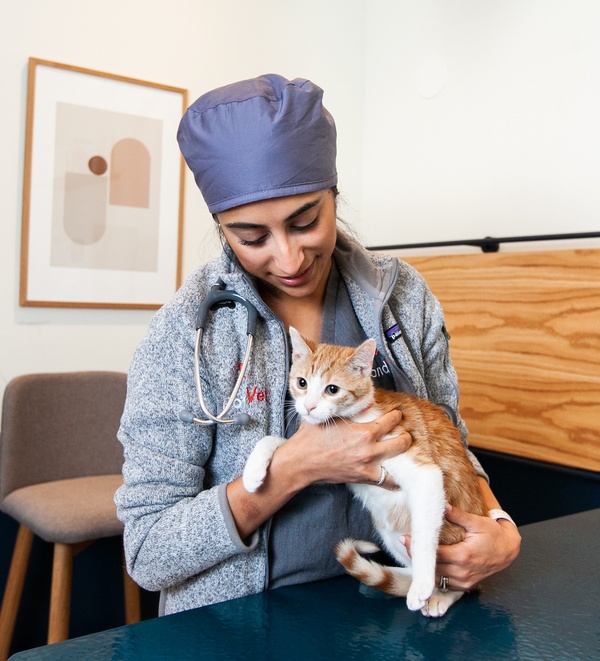
Why Is My Cat Throwing Up?
For most cats, an occasional hairball is no big deal — even if it’s unpleasant for you when you accidentally step on the hairball with your bare feet! But, if your cat is vomiting — which means throwing up food, clear or colored liquid, foam, or more — that could be a sign of a health problem. Here are some important things to know as a cat owner if your furry friend is throwing up.
Symptoms: Is it vomiting or something else?
To know for sure if it’s vomiting, look for active retching or heaving, along with throwing up food, bile, mucus, white or yellow foam, or more.
On the other hand, if your cat vomits food they’ve just eaten — especially if it’s undigested food and there’s no heaving, retching, or gagging and instead the food just “falls out” suddenly — this is more likely to be something called regurgitation.
The difference can be subtle, but vomiting and regurgitation have different causes and therefore different treatments.
Of course, if your pet is ill and you don’t know these specific details yet, that’s OK. The most important thing is to seek care so your cat can start feeling better as soon as possible.
Why do cats vomit?
There are many possible causes of throwing up in cats, including:
- Eating something they shouldn’t have (such as spoiled food, food from the garbage, or a foreign body).
- Food allergies and food sensitivities.
- Eating too fast (especially if your kitty is throwing up food soon after they eat, but otherwise acting normal).
- Hairballs.
- Infections.
- Parasites, such as roundworms.
- Eating something toxic.
- Pregnancy.
- An internal problem such as kidney disease or liver disease, constipation, or hormonal imbalances.
- Swallowing an object that got stuck in the stomach or intestines (like a plastic toy) — this typically requires surgery.
- Certain cancers.
Causes of vomiting can range from “nothing to worry about” to very serious, even life-threatening. So, when in doubt, it’s wise to bring your furry friend to the vet to know for sure.
Is my cat’s vomiting serious?
If any of the following conditions apply to your kitty, you’ll want to seek veterinary care immediately…
- Frequent or acute vomiting, especially if your cat keeps throwing up when their stomach is empty.
- Vomiting that lasts more than 1-2 days. If your cat is experiencing chronic vomiting, they may have IBD (inflammatory bowel disease).
- You know they’ve eaten something they shouldn’t have — like a toxic substance, or a toy that could be causing a blockage.
- Throwing up with diarrhea — this makes the risk of dehydration much higher.
- Loss of appetite for more than a day.
- Lethargy or a fever.
- Throwing up blood.
- Weight loss.
- Any signs of abdominal pain, such as crying, a hunched-up posture, or reluctance to let you touch their abdomen.
- Dehydration — you can assess this by:
- Checking their gums to see if they're dry or pale (a big sign of dehydration)
- Skin “tenting” — gently pull up on the skin over the shoulder blades and see how quickly it sinks back into place. If it stays up like a tent, your cat is probably dehydrated.
Please note: The above list is relevant to otherwise healthy, adult pets. If you have a young kitten, a senior cat, or a cat with a medical condition, you’ll want to be more cautious and seek care sooner. These pets may be more severely affected by dehydration, loss of nutrients, and other consequences of vomiting, regardless of cause or reason.
How is vomiting in cats treated?
Treatment usually depends on what was causing the vomiting in the first place. So, in addition to a physical exam, your veterinarian may recommend blood tests and X-rays. This will help your vet get to the bottom of the issue sooner, to prevent dangerous complications and deliver more efficient (and often, less expensive in the long run) treatment.
And if all the tests come back normal? Well, then you’ll have good news and peace of mind.
General treatments
To prevent complications and get your buddy feeling better, here are a few common treatments for most kinds of vomiting…
- A bland diet such as chicken and rice or a prescription diet for sensitive stomachs.
- Smaller meals until they're feeling better and can keep food down.
- Fluid administration. Your furry friend may have lost important electrolytes when they were throwing up. A balanced fluid solution, given by your vet team via an injection just under the skin, can correct dehydration and restore a healthy electrolyte balance.
- Rest until they are feeling better.
In addition to these treatments, some cats will need medications. Also, additional care will be recommended to treat the root cause of the vomiting, and to help very ill pets recover safely.
Remember, don’t give any human medications or home remedies without checking with your vet first — many are dangerous to pets!
Preventing vomiting in cats
Try these tips to decrease the chances of your pal throwing up:
- Keep your pet up to date on routine medical care, including vaccines. (This is especially important for kittens!)
- Keep your kitty indoors to prevent exposure to toxins, garbage, and other dangers.
- Prevent access to toxic substances, garbage cans, and any toys or objects that could be accidentally swallowed.
- If your cat eats fast, try feeding them smaller meals more often.
- To reduce hairballs, brush your cat's coat and try adding fish oil to their diet.
Many of these tips will go a long way toward preventing other health problems besides vomiting, too.
And should your furry friend ever start throwing up, remember to seek care as soon as possible — you’ll decrease the likelihood of complications, and your cat will thank you for the relief from a queasy tummy.